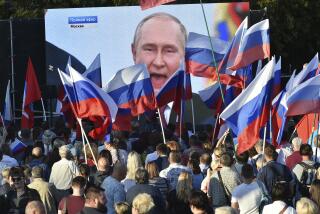Bracing for Change in Restless East Europe
- Share via
ROME — There was a time after the Treaty of Verdun, a time that lasted for about 1,100 years, when major European wars tended to be fought for pieces of an impossibly long and narrow kingdom--the Low Countries and parts of Germany, France and Italy--awarded to Lothair I in 843.
Inside today’s Europe, the zone of contest and confrontation lies farther east, in the group of countries that fell under Stalin’s dominance after 1945. It is not hard to imagine, among several possible scenarios, one or another of those nations rising up. Then the Soviets decide they cannot tolerate it. They finally invade. The uprising people are not cowed but continue; the result is horrendous bloodshed; Western governments decide they cannot tolerate that; they warn Moscow to stop, and . . . at some point comes a big bang.
Let us hope against this. But even now, in almost every country in that region, there is enough going on to warrant a new version of that periodic news story headlined “Ferment in Eastern Europe.” The ferment this time is increased by what is going on in Moscow.
Mikhail S. Gorbachev is moving in new directions faster than anyone predicted. Reports from Prague indicate that the Czechoslovak leadership, afraid that the wind from the East may blow reform instead of freeze, has even held up distribution of some issues of Pravda. The aged leaders of Eastern Europe like Gustav Husak of Czechoslovakia, Janos Kadar of Hungary and Todor Zhivkov of Bulgaria must also wonder what the coming to power by the younger Gorbachev must mean for them. It is obvious that they will soon leave the scene, but leave it to whom? Just as in the Soviet Union itself, where defenders of the status quo clearly outnumber the reformers in top ranks, so in Eastern Europe there is not just ferment but a vast bureaucracy interested mainly in self-preservation. And, just as in Eastern Europe, so in the Soviet Union, the fight is on.
Given all this, and given an Administration in Washington that, like Husak, is reportedly more interested in survival than in new moves, is there any reason to think the situation in Eastern Europe can change much for the better in coming years? My answer is that the situation can indeed improve, though not quickly.
In two years’ time, God willing, there will be a new Administration in Washington that includes wise statesmen, and in Moscow the wind of reform will perhaps have grown even stronger. It took a long time for the West and the East to sit down to strategic-arms talks; it will take longer to start talking about Eastern Europe.
Movement toward major changes for Eastern Europe should in any case begin on the Soviet side. It was, after all, the Soviet Union that made Eastern Europe into that set of cruel but antiquated dictatorships. But this would be a far greater undertaking for Gorbachev than any of his relatively modest moves up to now. Nothing is more important for the Russians than protecting their European flank. Stalin’s grab of Eastern Europe could be justified in Russian terms as providing a necessary buffer, a guarantee that no Wehrmacht would roll east again. Unfortunately the fact that it has become a buffer to progress, even in terms of Soviet interests, is still not recognized in Moscow.
The Soviets want stability on their borders; they hardly have it in today’s Eastern Europe, in spite of Soviet divisions and some of the world’s most efficient police systems. The Russians may well want peace with the West; but the Warsaw Pact and the East European trade organization, Comecon--indeed the whole Soviet approach--remains as always an obstacle. Nor is Eastern Europe the economic boon to Moscow that it was after World War II; the Soviets found years ago that they could buy in the West, or even make themselves, products as good as what came out of their allies’ increasingly obsolete factories.
But a better future for Eastern Europe must come out of Western Europe, too, not just out of Moscow. A solution, some day, must come from a whole new European system. The Russians have failed to produce anything of the sort that works, and prewar history indicates that an Eastern European union would never work, either. Leninism papered over a series of sharp old quarrels between Eastern European countries, some of which are visible again. The answer may be found, in part, in continuing slow expansion of the European Community’s links with the East, already considerable.
The question is one of normalizing intra-European contacts on all levels, following up indeed on the Helsinki agreements. We know the difficulties caused by Western concerns about strategic trade items and Eastern governments’ distrust of their own populations. But the difficulties are not insoluble, if Moscow can come to agree with us that major changes must be had.
But the big thing is the military confrontation. To think big about Eastern Europe means considering the eventual end of both the Warsaw Pact and the North Atlantic Treaty Organization. It means ensuring that individual Warsaw Pact members do not turn into individual crisis-makers in Europe. It means ensuring for both West and East that a Germany bigger and stronger than anything else in the heart of Europe would not again turn aggressive.
These are bigger thoughts than have been thought in Washington for some decades. Our policy, based on the sensible assumption that little new in Eastern Europe could be expected from a Leonid I. Brezhnev, amounted to small carrots, like most-favored-nation trade status for countries showing a degree of autonomy, and small sticks (no American ambassador for Warsaw) when we were angry.
Only in a case like Poland, when 20 million Polish-Americans kept reminding us that the place existed, did we exert ourselves, under the Reagan Administration, to seek a good relationship. Yet we had better start thinking big about Eastern Europe, because Gorbachev may well do so after he has his Central Committee fully with him--and, given the man’s apparent vigor and ability, that may not be far off. It will not be much easier for us to think about these things than it is for a leader in Moscow. Could we ever conceive of pulling all our forces out of Europe, as part of the price for something new? What about our own economic interests? And how much faith could we put, would we have to put, in Moscow?
We do not have to rush to provide answers to questions Gorbachev has not raised. We need, rather, to proceed with the utmost care on European questions, as always, because nothing beyond our borders can be more important to us--or to the Soviets.
More to Read
Sign up for Essential California
The most important California stories and recommendations in your inbox every morning.
You may occasionally receive promotional content from the Los Angeles Times.













